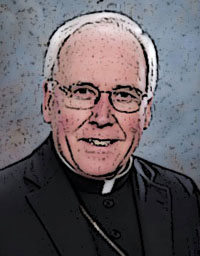Bishop Malone: Challenge of building religious relationship with youth
by BISHOP RICHARD J. MALONE
For several years, I have been following the research of Christian Smith, currently a professor and director of the Center for the Study of Religion and Society at Notre Dame University. Smith and his colleagues began in 2001 the National Study of Youth and Religion, the most comprehensive national study ever conducted about American teens' religious and spiritual lives.
Smith focused his early research on a broad sample of U.S. teens ages 13-17, different in religion, age, race, sex, socioeconomic status, rural-suburban-urban residence, region of the country, and language spoken. His first publication, "Soul Searching: The Religious and Spiritual Lives of American Teenagers," hit the U.S. Catholic adolescent faith formation and youth ministry community, as one reviewer put it, as a "bombshell."
An example from Smith's chapter on Catholic teens tells you why: "Compared both to official Catholic norms of faithfulness and to other types of Christian teens in the United States, contemporary U.S. Catholic teens are faring rather badly. On most measures of religious faith, belief, experience and practice, Catholic teens as a whole show up as fairly weak."
I was reluctant at first to report here on Smith's conclusions because in my travels around the diocese, I meet many teens (and young adults) who are faith-filled, enthusiastic Catholics, truly the young Church in our midst. And we should all be grateful to the corps of dedicated women and men who serve at the parish, campus and diocesan levels in youth and young adult faith formation ministry. They are doing wonderful work, as are so many of our Catholic families.
Smith's conclusion, though, is that it is families, especially parents, that make the critical difference. "It does not appear to be the case that most U.S. Catholic parents of teenagers are struggling mightily to live out vibrant lives of Catholic faith and yet find their teenagers to be religiously apathetic and resistant. Rather, it appears that the relative religious laxity of most U.S. Catholic teenagers significantly reflects the relative religious laxity of their parents ... We think the evident 'problem' of Catholic teens is rightly seen in part as a larger challenge of Catholic adults generally, and parents specifically."
There is a clear challenge here to all of us who care to strengthen the faith commitment of our Catholic families, especially parents. Parishes and schools with robust, family-focused faith formation, including vibrant youth ministry and adult catechesis that arouses faith as well as informs it, have the best chance to reverse the drain of our young people from active Catholic life.
If you think the word "drain" is an exaggeration, consider the titles of Professor Smith's last two books, each of them a longitudinal follow up study to "Soul Searching," "Lost in Transition: The Dark Side of Emerging Adulthood" (2011), and "Young Catholic America: Emerging Adults In, Out of, and Gone from the Church" (2014).
Once again, Smith concludes "Most central in (young adults') entire process of religious socialization is having strong relational ties to religious adults, both parents and non-parental adults. Precious few Catholic youth become highly religious young adults without enjoying such bonds."
So let's get busy building those bonds! And remember, we are not alone in the effort. It's all first and always the action of the Holy Spirit, the Divine Pedagogue, who has entrusted us with a share in His work!




